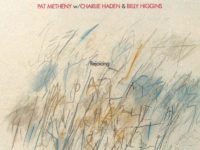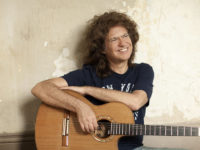Pat Metheny’s New Chautauqua has been one of those records in which I’ve sought refuge ever since the first time I heard it in the music listening room at my college’s student union in the early ’80s. Metheny has made other “quiet” records since, including One Quiet Night and What’s It All About, but this one is the earliest – and it will always be the one that most strongly connects with me.
Released in April 1979, New Chautauqua wasn’t my first Pat Metheny record – or even the only Metheny record from that year. My brother bought me my first one, American Garage, released later in ’79, sparking up a fandom of Metheny’s music that continues strong today.
New Chautauqua remains intriguing because it was arguably the first of many of his “diversion” albums, where he indulges in a side of himself – usually alone or with minimal accompaniment – that he doesn’t really get to dig into on Pat Metheny Group albums or other “main” albums.
This one doesn’t neatly fall into the jazz or fusion categories; it’s even relatively light on improvisation. New Chautauqua is more like an organic new age / bluegrass / instrumental-folk record that’s unconcerned about how you might slot it. Pat puts forward original pastoral tunes mainly on acoustic guitar, alongside dubbed-in electric bass and electric guitar – and no percussion.
In this serene and subtle context, delightfully uncomplicated emotions flow out: There’s joy (“New Chautauqua”), contentment (“Country Poem”), dreaming (“Sueño con México”), and peacefulness (“Hermitage”), among others.
“Sueño con México” – which Pat Metheny memorably returned to as part of 2013’s live Orchestrion Project – has long been my favorite track. Shaped by beautiful glissando guitar picking resembling the falling of light rain, Metheny fashions an unexpected climax by briefly dubbing a flamenco-style guitar in a somewhat dramatic fashion – then receding back to that dreamy state, subtly inserting a few harmonic patterns over that hypnotic repeating figure.
It’s like a kind of bliss. In fact, the common thread in all of the emotions this record evokes is that they are desirable states of mind. That’s why I keep coming back to New Chautauqua.




Pat is the best. There are definitely other Pat nerds out there!
Pat is my music hero. I have travelled the world following Pat & his music. Some 140+ gigs in 20+ countries and I still love this music. Sueno provided the soundtrack for my pilgrimage to Lees Summit / Unity Village a few years back.
We are definately out there. UK.
gaz – I have gone to Lees Summit twice. I even found Lone Jack! Glad to know I’m not the only Pat freak out there. ; )
Way to go Antonia. My trip was for the Metheny Music Foundation event in Unity Village. Pat played trio with Antonio & Christian then his brother Mike joined them for a couple of tunes.
I flew in from London, UK and met friends from Detroit & San Diego. We also did a tour round Lee’s Summit looking at Metheny related sites…..